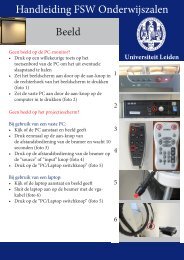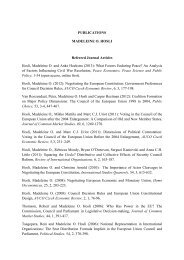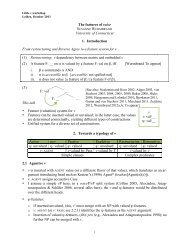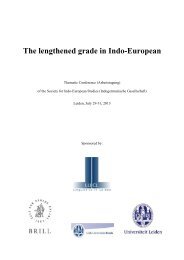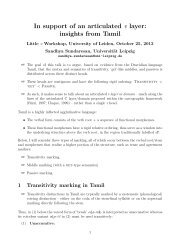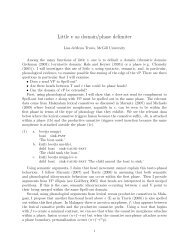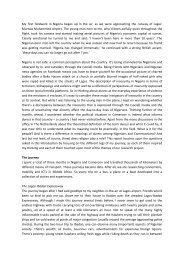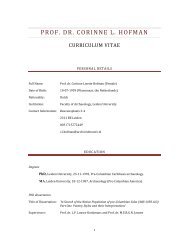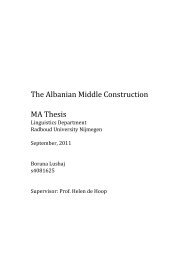LUC The hagUe ProfiLe 1
LUC The hagUe ProfiLe 1
LUC The hagUe ProfiLe 1
You also want an ePaper? Increase the reach of your titles
YUMPU automatically turns print PDFs into web optimized ePapers that Google loves.
courses (10 credits) related to the field of the major, and a 10 credit capstone<br />
project.<br />
3. Each major is effectively composed of three tracks, in each of which each<br />
student must complete three courses, usually one each at 100, 200, and 300<br />
level.<br />
4. At least two of the tracks should be connected by an integrative course,<br />
which is a compulsory component in all study plans.<br />
5. For each major a list of pre-approved tracks is provided in the prospectus.<br />
Students can elect to take these in the form suggested.<br />
6. In each major there is also space for additional elective courses.<br />
7. Students can choose courses for the major from the courses listed in the<br />
relevant part of the prospectus, tagged as relevant to their major.<br />
8. A major should include at least 30 credits at the advanced level (level 300 or<br />
higher). This includes the 300-level courses so tagged as well as the integrative<br />
course and the capstone.<br />
9. Courses can be tagged as part of more than one programme component or<br />
major. Yet, a student can only use the credits earned once (ie. in one part of<br />
his/her individual programme).<br />
10. Capstone is the concluding educational unit at advanced level to be followed<br />
in the student’s last semester at <strong>LUC</strong>, with a total value of 10 credits. It is not<br />
only the capstone of the major, but should integrate knowledge from across<br />
the programme in an interdisciplinary way. A proposal for the capstone<br />
should be discussed with a potential supervisor before being formally approved<br />
by the Examinations Committee before the end of the semester prior<br />
to the semester during which the capstone will be carried out.<br />
ART. 3.4 - MINOR<br />
1. A minor normally consists of 30 credits (six courses) chosen from outside<br />
the area of the major.<br />
2. <strong>The</strong> courses in the minor must form a coherent programme in an identifiable<br />
field, to the satisfaction of the Examinations Committee. Students must apply<br />
for recognition of a minor in the penultimate semester.<br />
3. <strong>The</strong> minor must include at least 10 EC at advanced (300) level.<br />
4. <strong>The</strong> minor may be comprised of courses offered within <strong>LUC</strong> or outside,<br />
subject to the approval of the Examinations Committee.<br />
5. Courses can be tagged to serve in more than one programme component<br />
80 aCaDeMiC rULes aND regULaTioNs<br />
or minor; courses from other majors can be taken as minor choices, but<br />
a student can only use the credits earned once (ie. in one part of his/her<br />
individual programme).<br />
6. Should these six courses fail to convince the Examinations Committee of<br />
sufficient coherence to constitute a minor, students may still receive credits<br />
for them as electives. In this case, they will not receive a minor on their<br />
degree.<br />
ART 3.5 GLOBAL CITIZENSHIP<br />
1. For the Global Citizenship requirement, the student has to complete 25<br />
credits, which can be chosen from the foreign language courses or the global<br />
culture courses or a combination thereof.<br />
ART. 3.6 - EXTERNAL EDUCATION<br />
1. Subject to the prior approval of the Examinations Committee, a student may<br />
follow courses that are provided by another faculty of Leiden University,<br />
another Dutch university or a university abroad (through the <strong>LUC</strong> Semester<br />
Abroad Programme).<br />
2. <strong>The</strong>se external courses normally count as electives or contribute to the minor.<br />
3. <strong>The</strong> maximum contribution of external education to the 180 credits required<br />
for graduation from <strong>LUC</strong> is 30 credits. With the approval of the Examinations<br />
Committee, a student is allowed to go abroad for one semester if the<br />
requirements to participate in the Semester Abroad programme are met.<br />
<strong>The</strong>se requirements are detailed in the Semester Abroad Guide.<br />
5. <strong>The</strong> semester abroad will normally take place in semesters 4 or 5 and will<br />
normally carry 30 credits.<br />
6. A student has to submit a proposal for his external education to the Examinations<br />
Committee at least a block in advance.<br />
7. A student can submit a request to the Examinations Committee to enlarge<br />
his or her external education programme with additional credits.<br />
8. <strong>The</strong> Examinations Committee determines before the start of the external<br />
education how the results obtained shall be translated into <strong>LUC</strong> credits and<br />
which part of the degree programme is replaced by the external education<br />
program.<br />
aCaDeMiC rULes aND regULaTioNs 81



